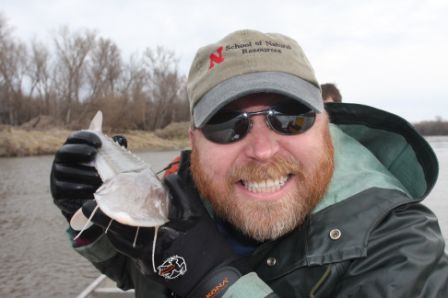
By Mark Pegg, Fisheries Ecologist
I joined UNL as an assistant professor in 2005 in what is now the Applied Ecology Faculty Area. I have an appointment equally split between research and teaching. My research is centered on three predominant themes: 1) the ecology of large rivers, 2) fish management and conservation, and 3) the influence of non-native species on aquatic resources. I am actively involved in undergraduate and graduate teaching, predominantly fisheries courses, and advising for the Fisheries and Wildlife major. I also serve as the faculty advisor to the Cornhusker Student Subunit of the American Fisheries Society.
My lab has several concurrent projects investigating the ecology of large rivers. These projects include investigations of community composition and structure across multiple spatial scales, population dynamics, habitat availability and use, and the structure and movement of habitat (e.g., large woody debris). Specific field data collections are ongoing or recently completed in the Missouri River, Platte River, and Niobrara River in Nebraska.
My students and I are also involved in management aspects of several popular sportfish species in North America. For example, we have been working on issues surrounding aspects of channel catfish and flathead catfish harvest management strategies in Nebraska, trophy catfish management in the Red River of the North (Manitoba, Canada), regional and larger-scale paddlefish conservation strategies, and how stocking trout influences species of concern.
Introductions of non-native species have created concerns world-wide over interactions with native species. As such, I have been involved in several studies over the years investigating the influence of the zooplankter Daphnia lumholtzi on larval fish, methods to disrupt life-stages of invertebrates such as zebra mussels, and more recently, control and management of Asian carp. The establishment of bighead and silver carp, both native to Asia, in the Mississippi River basin and the potential spread to other ecosystems has emerged as a national issue. I have been involved in national and international carp control issues including studying whether they compete with native species for food, developing basic bioenergetics models to help predict future areas of establishment, and education efforts to inform the public about how undesirable species are spread.
I regularly teach undergraduate and graduate fisheries related courses. Fisheries Science (NRES 463/863) deals with the conservation and management of fish in relation to their habitat and the humans that use the resource. Ichthyology (NRES 489/889) deals with evolution, taxonomic, and ecological aspects of fishes. I also team teach a graduate level course, Managed Aquatic Systems (NRES 965), with Kevin Pope that investigates how ecological processes have changed in regulated river basins as well as the associated problems or oppor¬tunities that arise in an ecosystem management context.
I lead a study abroad course to Namibia, Africa, every other summer (NRES 492) in odd years. This course provides an emphasis on the various ecosystems found in an absolutely stunning country and also provides students an opportunity to explore socio-economic aspects of Namibia. Needless to say, I have been charmed by Namibia ever since my first trip in 2004. After all, where else can you dine on smilies (if you don’t know what that is you probably don’t want to know!), dance with the Himba tribe – complete with ochre body paint -- or experience the lonely beauty of the Skeleton Coast?